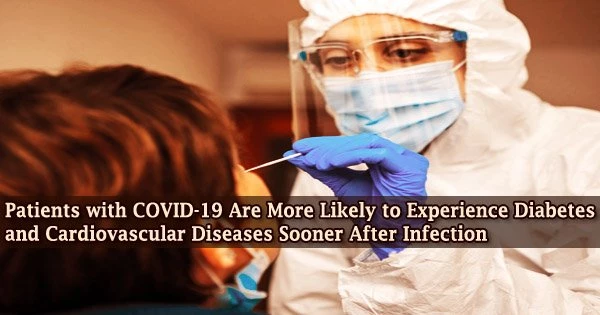According to a new study by Emma Rezel-Potts, Martin Gulliford, and colleagues from King’s College London in the United Kingdom, people who contract COVID-19 have a higher risk of developing diabetes and cardiovascular diseases, especially in the three months after infection. Their findings were published on July 19 (2022) in the open access journal PLOS Medicine.
Scientists are becoming more aware of COVID-19 as a multi-system disease that can affect the entire body and likely does so by inducing pathways that lead to inflammation.
Researchers in the latest study looked at whether a sample of COVID-19 patients had greater risks of diabetes and cardiovascular disease recurrence than a group of individuals who had never had the conditions in the year after infection.
They examined the anonymised medical records of 428,000 COVID-19 patients and a control group of patients who were matched for age, sex, and family practice. The investigation revealed that COVID-19 patients had 81% higher diabetes diagnoses in the first four weeks following infection and that their risk persisted at an increased level of 27% for as long as 12 weeks.
A six-fold rise in cardiovascular diagnoses was also linked to COVID-19, primarily as a result of the emergence of pulmonary embolisms (blood clots in the lungs) and irregular heartbeats.
The information provided by this very large population-based study on the longer-term effects of COVID-19 on development of cardiovascular conditions and diabetes will be extremely valuable to doctors managing the millions of people who have had COVID-19 by now. It is clear that particular vigilance is required for at least the first 3 months after COVID-19.
Ajay Shah
Within 12 to 24 weeks of infection, the chance of receiving a new diagnosis of heart disease started to fall and recovered to baseline levels or below.
However, luckily, there does not seem to be a long-term rise in the occurrence of these problems for patients who have received the virus. The researchers conclude that COVID-19 infection is related with an elevated risk of cardiovascular disorders and diabetes.
These results support the recommendation that physicians counsel COVID-19 survivors to lower their risk of developing diabetes by following a healthy diet and engaging in regular exercise.
Coauthor Ajay Shah adds, “The information provided by this very large population-based study on the longer-term effects of COVID-19 on development of cardiovascular conditions and diabetes will be extremely valuable to doctors managing the millions of people who have had COVID-19 by now. It is clear that particular vigilance is required for at least the first 3 months after COVID-19.”
Lead author Emma Rezel-Pottsconcludes, “Use of a large, national database of electronic health records from primary care has enabled us to characterise the risk of cardiovascular disease and diabetes mellitus during the acute and longer-term phases following Covid-19 infection.”
“Whilst it is in the first four weeks that Covid-19 patients are most at risk of these outcomes, the risk of diabetes mellitus remains increased for at least 12 weeks. Clinical and public health interventions focusing on reducing diabetes risk among those recovering from Covid-19 over the longer-term may be very beneficial.”
















